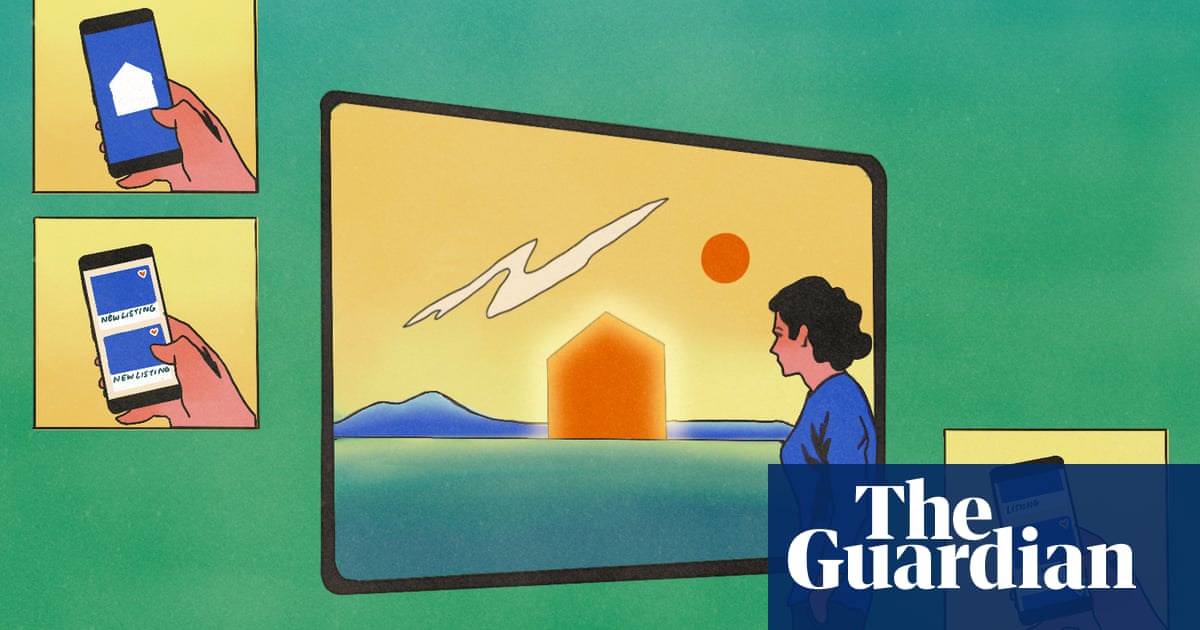
I’ve turned off alerts for my dating app. I don’t care about likes on Instagram. The only notification that sends me rushing to unlock my phone is the one that says: “A new property has been added in your area.”
For months now I have been hooked on property websites, browsing homes within my budget and – even more tantalizingly – those that most definitely aren’t.
With each new listing, I project myself into a different home: how would I fill three spare rooms? What theme nights would I host in my high-tech home auditorium? Am I really ready to commit to a lawn?
It may be my largest online time-suck – yet I can’t tell you why I do it, or even what I’m getting out of it. It’s this and other modern quandaries that I will be attempting to unpick in this new series.
As a journalist, I’ve always been interested in psychology, contemporary culture and how they overlap. I’ve reported on the lost benefits of boredom, in defense of silliness, how our screen addiction is reshaping our faces, and the impact of the housing crisis on our social lives (and our sex lives).
In this fortnightly column for Guardian US, I’ll be exploring how to live well and be happy(ish) in a world that, let’s be honest, doesn’t make it easy. These are questions that are widely shared, but lack obvious answers – adding up to an overarching one: Why am I like this?
In the case of fantasizing about real-estate, maybe you’re like this, too. A 2021 survey found that 35% of US adults said they browsed Zillow “just for fun”, sometimes for hours at a time.
The habit has been parodied by the New Yorker and SNL. Last year, rapper Iggy Azalea claimed to have “an actual addiction” to the site as well as the means to indulge it: “I keep selling my house so I have an excuse.”
For the rest of us, of course, it’s just window-shopping. “Searching for houses online has become a form of escapism,” suggests Daniel Copley of Zoopla, the UK’s answer to Zillow.
But I’ve started to wonder if it’s strictly harmless. Sometimes I’ll catch myself feeling yearning, frustration and even rage about all the houses I’ll never be able to afford.
It’s not the same idle diversion as watching celebrity home tours, or picking out ball gowns from the pages of Vogue: our real-estate daydreams cannot be separated from the waking nightmare that housing has become.
In the US, affordability is the worst it’s been in decades, affecting would-be buyers and renters alike. The crisis is most acute in big cities (even non-coastal ones), where a shortage of supply has coincided with rising rents. Last year, the average national rent-to-income ratio reached 30% across the US for the first time in decades.
It’s a similar story in the UK. In London, where I used to live, the average monthly rent is now over £2,600 ($3,218.93); I don’t see myself ever returning.
Even so, I’ll sometimes look up listings in my old neighborhood, scrolling through the dingy studios and glorified parking spots with mounting horror: they want how much for that?
Retreating into fantasy – about property, or whatever else we want but can’t have – affects us differently.
“For a lot of people, it can be completely harmless,” says Marie Houghton, a PhD student researching housing psychology at Birkbeck, University of London. But for others, fantasy can be maladaptive: “a way of ruminating, thinking about the other things you can’t have and potentially lead to feelings of self-blame”.
Apparently, individuals ranking high on neuroticism are especially prone to the latter (go figure). But even people who own their homes might not feel secure enough to look away from the market, fearful of their key asset losing value. Danny Dorling, a professor of human geography at Oxford University, mentions friends who appear to know “every single property” for sale locally: “Years after managing to buy, they still carry on looking.”
It reflects the stress and anxiety that’s now intrinsic to housing, even for those fortunate enough to own. Keeping those property alerts enabled, Dorling suggests “can be a way of counting your blessings: ‘Thank god I’m not in the market anymore.’”
I’m reminded of coupled friends’ schadenfreude in swiping through my Hinge, thanking their lucky stars they’re settled. It may even be more meaningful with housing: according to one survey, 49% of people would rather browse Zillow than have sex. But as with the real thing, the allure of “real-estate porn” lies in the gap between fantasy and reality.
Fueling our feverish refreshing is the faint hope that we’ll be the lucky ones to land on the fabled “bargain”. But with house prices now up to 16 times household incomes, even in smaller cities, the grim reality is that, for many within “Generation Rent”, owning is out of the question. A recent survey found that 66% of US renters feel “hopeless” about ever buying. So why do we keep pressing our noses up against the window?
A house is never just bricks and mortar; it’s your home, and for many a symbol of maturity. “It’s become tied up with a lot of ideas about success and ‘making it’,” says Houghton. Many of us are conditioned from childhood that a mortgage is a goal, a milestone and even a moral good: “It can be hard to let that go.”
We may rationalize browsing Zillow as market research, but it also keeps us focused on what we can’t have. Houghton links this to “cruel optimism”, coined by the late American scholar Lauren Berlant to describe something you desire becoming “an obstacle to your flourishing”.
Today, the ideal of home ownership is one such “problematic attachment”, representing a broken promise we’re continually being reminded of. Meanwhile, alternatives aren’t obvious. “Even though it’s kind of harmful to keep hoping, if you give up on that idea, there might not be anything else to replace it – and that might actually leave you feeling hopeless as well,” says Houghton.
To give up on the goal altogether means opting out of social norms, she adds: “It almost has an impact on your identity.”
I can relate: I’ve called three cities home in the past decade, but none where it was possible for me to buy or even rent an apartment by myself. This made me feel increasingly jaded and powerless, like my ties there were temporary.
There was little I could do about the housing crisis. But, I realized, I could reframe my ideas of success within it, and come up with my own vision, even if it was modest.
I ended up deciding that living alone was more important to me than living in London, and moved to a smaller, more affordable city. It was a bittersweet decision, but it also helped me to feel less preoccupied by what I couldn’t have or do or change – and more attuned to what was actually within my control.
That’s why I try to remind myself when I tap through to the latest property listed in my area: perhaps what I’m really searching for is the promise of stability, proof that housing is broken, or even a reason to stop looking entirely.
But there’s no sense in looking to the property market for peace of mind: it may even undermine our sense of agency, as well as draining our time and energy. When the ladder is this broken, instead of obsessing about why we can’t make it onto the lowest rung, we might be happier stepping away.












